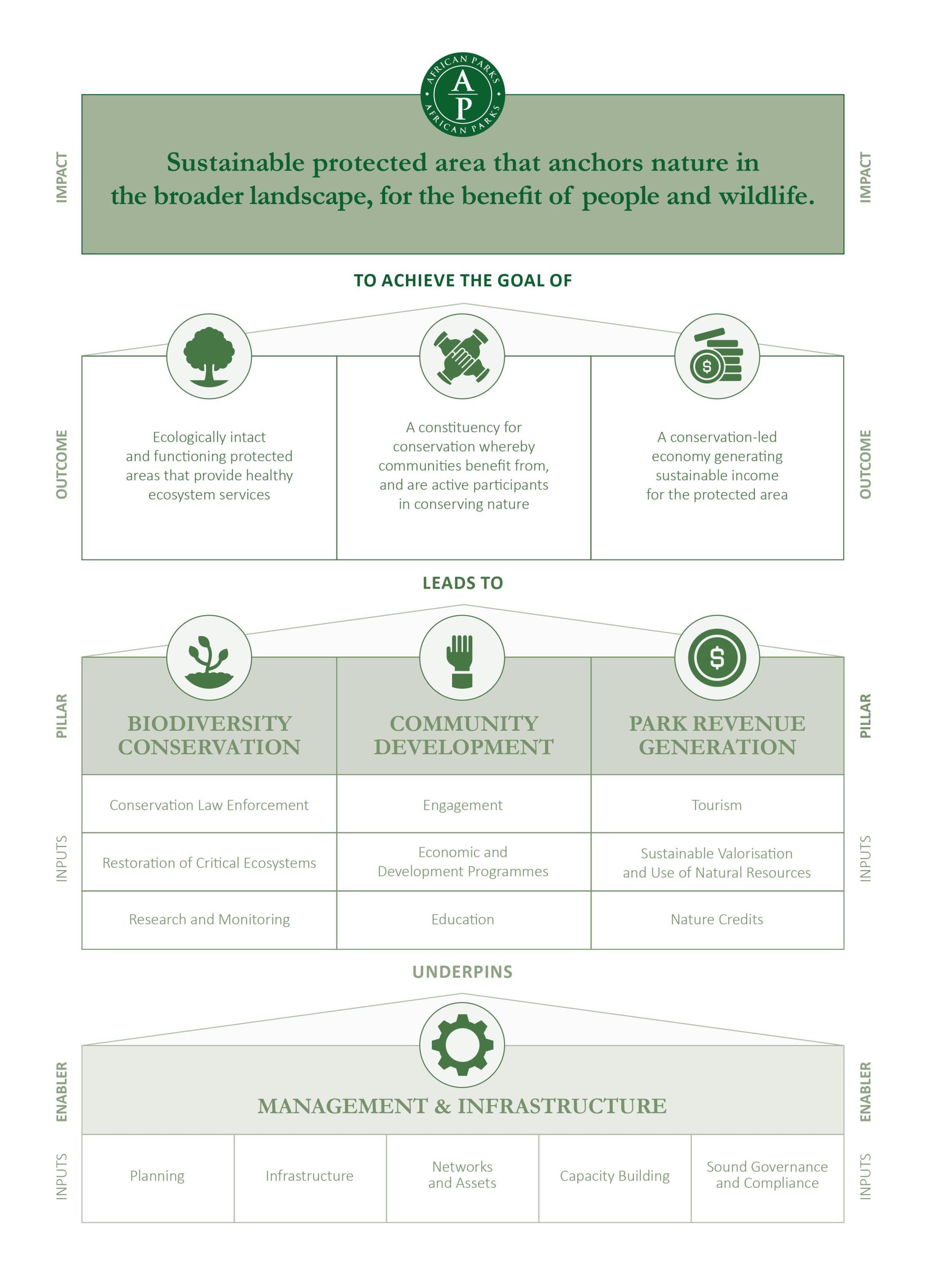A protected area management approach in pursuit of long-term ecological, socio-political and financial sustainability.
African Parks pioneered the Public-Private Partnership (PPP) model for protected area management. To execute this model, African Parks signs long-term management partnerships with governments and local communities, for one or more protected areas, making it responsible for the execution of all management functions related to that area. This approach means African Parks is accountable to its partners, who remain the owners of the protected area and its natural resources, and who determine national conservation policy. Support of local communities is essential for effective conservation. Management is done in collaboration with local communities and where applicable, established use rights are upheld and built into relevant agreements and plans. When well-managed, these areas provide ecosystem services that are essential for human wellbeing, as well as establish security and governance, which creates a broader enabling environment for socio-economic development.
Our approach is defined by three key components (the 3M’s) that need to be established for each area:
Mandates – this refers to the long-term contractual agreement, or mandate, which enshrines government ownership, national laws and policies, and grants African Parks responsibility for the day-to-day management of the park, within a defined framework. African Parks is accountable to the government and community partners for delivery against this mandate.
Management – this refers to African Parks’ personnel entrusted with executing the mandate, and the governance structures put in place. A separate legal entity is registered in the host country, through which the management partnership is implemented. A governance body is established for each entity, to ensure strategic oversight of the project; this body has representation of both government and African Parks, as well as other key stakeholders. African Parks appoints the park management team, who drive the decision making and the actual activities undertaken in each protected area, in accordance with African Parks’ Standard Operating Procedures, national laws and the mandate. As African Parks is accountable to its partners, it retains the right to discipline non-performing or non-compliant team members.
Money – this refers to the funding mechanisms that are necessary to manage the protected area – with a focus on sustainability. This is a blended solution including operational revenue from the parks, proceeds from the monetisation of ecosystem services, institutional funding, private philanthropy and government support.
Three Key Pillars of Management
Management activities in each protected area consist of three key pillars:
i) Biodiversity Conservation, ii) Community Development, iii) Park Revenue Generation - all of which are underpinned by a foundation of Management and Infrastructure.

Biodiversity Conservation – In order for protected areas to provide the full suite of ecosystem services, biodiversity in the area needs to be intact and fully functioning. Conservation law enforcement ensures that national wildlife laws are upheld and established use rights are respected, to prevent poaching or other illegal natural resource extraction. Conservation law enforcement also supports the management of sustainable natural resource use, mitigates human-wildlife conflict, and brings about stability in the broader region. Wildlife research and monitoring activities enable a better understanding of conservation management efforts, while wildlife reintroductions or supplementations, and alien species clearance restore biodiversity. In turn, ecologically functioning ecosystems provide healthy watersheds, clean air, carbon sequestration, food security and better health for people and wildlife.
Community Development – Protected areas are a choice of land use and the sustainability of these areas comes from a combination of good management and the support of local people. The active participation of local communities in conservation is necessary to expand impact into the broader landscape. Local communities, who are residents of, and rights holders in these landscapes, are not only beneficiaries of conservation efforts, but key contributors. There is a focus on positive community engagement, ensuring that local people participate in decision making structures, including building capacity and structures for community-led governance of natural resources, and that communities are informed about park management interventions. Education and sustainable socio-economic development support active community involvement in conservation efforts, alleviate poverty and build local economies. This in turn creates an active constituency for conservation where local communities not only support protected areas into the future, but actively participate in expanding conservation into broader landscapes.
Park Revenue Generation – Through tourism, sustainable utilisation of natural resources, payments for eco-system services and associated conservation-compatible enterprises, revenue is created that flows directly back into the management of the park. Creating a governance framework and a climate conducive to commercial investment is essential. This in turn supports a conservation-led economy, generating long-term income for the protected area, alleviating poverty in its surroundings, and reducing donor dependence over time.
The foundation of Management and Infrastructure incorporates sound governance; strategic planning; employment; capacity building; and the investment in infrastructure, communication networks and appropriate assets.
Together these actions and their impacts lead to protected areas being secured and valued in perpetuity, with active stakeholder participation that supports conservation of the broader landscape for the benefit of people and nature.